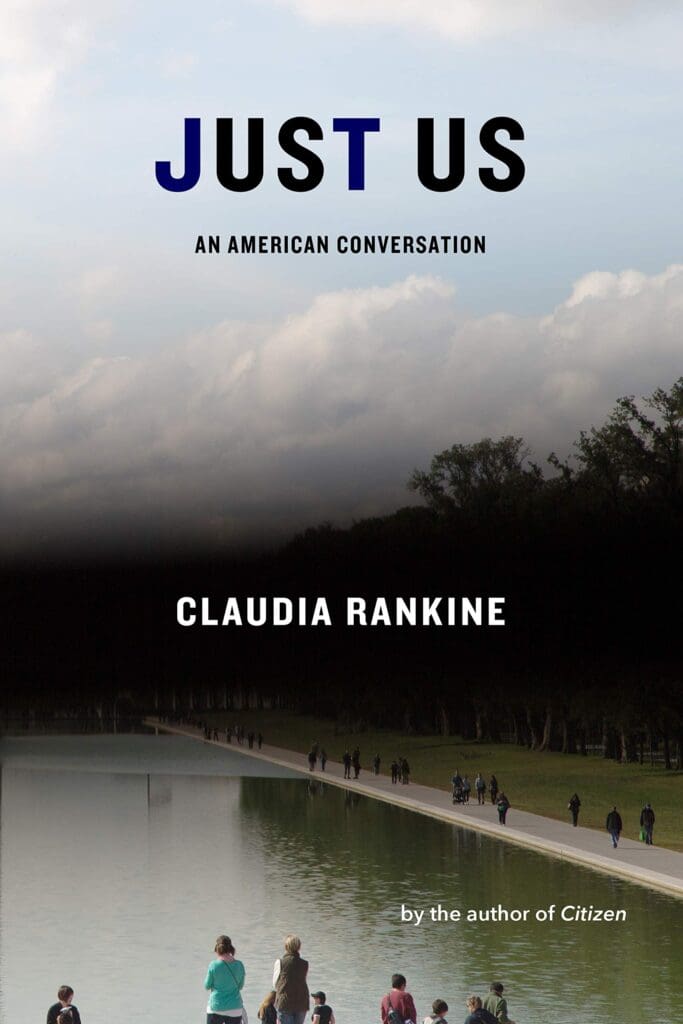The title of Claudia Rankine’s new collection of essays, Just Us: An American Conversation (352 pages; Graywolf Press), alludes to a Richard Pryor quote from a 1979 stand-up routine about the criminal justice system: “You go down there looking for justice, that’s what you find, just us.” The quote is just as potent now as it was then, with mass incarceration making prisons disproportionately Black, and relevant to Rankine’s stance as she confronts white silence and privilege. But the title also evokes community, a sense of a unified “us,” as well as the more private “us” that exists when we are in conversation with another.
Whereas Citizen: An American Lyric was an expansive examination of the individual in the face of a racist system in America, Just Us is focused more on interpersonal communication and how that system manifests in those more intimate settings like dinner party conversations and correspondences; Rankine’s latest collection of essays focuses on the insidious ever-presence of white supremacy through the examination of conversations. A print in Rankine’s home bears these words from Eve Fowler: “Anyone telling anything is telling that thing.” Rankine is examining that thing. What is that thing that we are saying, trying to say, or revealing by not saying?
In “ethical loneliness,” Rankine and a white woman friend attend a showing of Fairview, a play which requests that the white members of its audience walk onstage. The white woman remains in her seat while others fulfill the request. Later, out of an unquietable frustration at her friend’s inaction, Rankine confronts her. The friend eventually responds with a letter, explaining that she felt frustrated by the idea that the emotional labor of white people equates to the real labor of dismantling white supremacy in tangible ways. “I appreciate my friend’s response even as I began to engage it critically,” Rankine writes. “But, also, always there remains her life, her experiences, that speak back to me.”
Rankine then translates the account into found poetry, which is—outside the found poem layout—as follows: “She doesn’t respond. / refusal/ like/ dropped/ dream/ I didn’t want to./ no/ cannot/ I am not/ the whiteness./ I imagine.”
The collection contains essays on topics such as racist experiences during airline travel; the HBO series Big Little Lies; “black blonds” and the politics of being Black and blond; racist white educators; Rankine attending marriage therapy with her white husband; and Naomi Osaka, in an essay which feels somewhat like a brief continuation of her wonderful piece on Serena Williams in Citizen. The project is incredibly comprehensive, complete with a range of mediums such as photographs, Tweets, and video stills, alongside references to pop culture, historical events, psychological and other studies, and letters from friends that enrich the essays. Rankine also provides dozens of thorough “fact checks” to her claims, as white supremacy often necessitates its opponents to establish credibility.
“liminal spaces” is a three-part series of essays, two of which function as the collection’s bookends, with the other, Part Two, placed near the middle. In “liminal spaces ii,” Rankine begins an interrogation into the function of conversations themselves: “To converse is to risk the unraveling of the said and the unsaid./ To converse is to risk the performance of what’s held by the silence.” And later in the essay, following dialogue from a viral YouTube video in which a white woman blocks a Black man from entering his apartment building, she continues, getting at the heart of Just Us: “What rises up within, between us? What comes up because we are the history within us?”
“There’s no strategy here,” one of Rankine’s friends impatiently remarks after reading the book, a detail which Rankine includes near the end. Rankine writes then that “response” is her strategy. Concerted strategy is vital to dismantling white supremacy, but so is “remaining in the quotidian of disturbance” through conversations, questioning, and criticism. The conversations we have—and don’t have—and the way we have them speak volumes about who we are.

